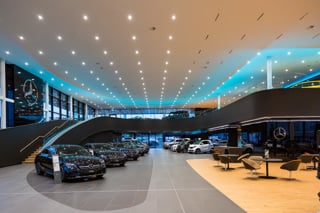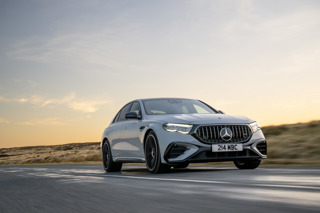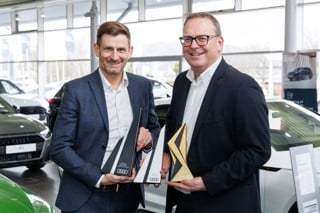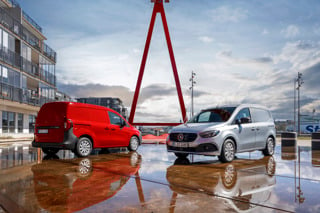[gallery id=1366]
The German premium manufacturer’s LCV division, which became a separate legal entity to parent company Daimler and, more crucially, split from Mercedes-Benz Trucks in January, is on a push towards making its dealerships more retail-friendly, according to head of network operations, Sarah Palfreyman.
“Most of our partners started out as truck partners and when we brought vans into the market they also took on the van franchise,” she said.
[gallery id=1366]
While customers of Mercedes-Benz passenger cars will be used to ‘glass palace’-style dealerships, customers of its commercial products are accustomed to a more utilitarian experience. However, that is about to change, according to Mercedes-Benz Vans’ network chief.
The German premium manufacturer’s LCV division, which became a separate legal entity to parent company Daimler and, more crucially, split from Mercedes-Benz Trucks in January, is on a push towards making its dealerships more retail-friendly, according to head of network operations, Sarah Palfreyman.
“Most of our partners started out as truck partners and when we brought vans into the market they also took on the van franchise,” she said.
“However, the majority of our competitors have grown their commercial vehicle franchise via their passenger car network.”
Palfreyman said this creates different challenges for Mercedes-Benz Vans and that part of her job is trying to provide a more ‘retail’ format while retaining the flexibility that the truck business provides.
“The network that we have, in terms of the structure, brings with it lots of benefits. For example, without the truck network it’s unlikely we would be able to run 24-hour workshops.”
She intends to further separate the van and truck sides of the business this year by increasing the number of dedicated Van Centres in the network, so it can cope with SMEs and private buyers alongside its traditional fleet customers.
She will also require dealers to gain accreditation in the manufacturer’s Van Pro scheme, by having a showroom and passing an audit, before they can sell the new volume-boosting X-Class pick-up truck.
Most Mercedes-Benz van dealers currently hold both truck and van franchises, along with a few aftersales centres that are shared with passenger car dealerships.
Two dedicated Van Centres opened last year – Euro Commercials in Cardiff and Roanza in Liverpool. Rygor Commercials also launched a new, purpose-built van and truck site in Gloucester, and there were site redevelopments from Mertrux Nottingham, Orwell Truck & Van Ipswich and Northside Truck & Van Sheffield.
In total, Mercedes-Benz Vans has 116 locations in the UK, 64 of which are dedicated sales sites, with the rest offering aftersales. By contrast, in Europe all the sites deal with car, van and truck.
Retail sales grew by 8% last year and the brand is keen to expand into new segments and new markets, with a particular interest in the lifestyle customer.

“Customer demands have driven us to evolve our product to provide the best of both worlds – a commercial vehicle that offers additional benefits when not being used for work, for example, our Vito Tourer, and future X-Class products,” said Palfreyman.
In terms of the franchised network, she believes there is no one-size-fits-all solution – some joint dealerships already have van-dedicated space and staff and some have van-specific showrooms.
“We also have new facilities that accommodate both truck and van very successfully. We will review each location on its own merits, taking factors into account such as capacity, retail environment, and location, and will evaluate, working with our dealer partner, whether we can find a truck and van solution, or a more dedicated van solution, which could include a showroom.”
At the centre of Mercedes-Benz Vans’ drive towards professionalisation of the network is the Van Pro dealer excellence scheme. It was introduced across Europe five years ago by Daimler, to make dealers more retail-ready and to increase their focus on vans.
[gallery id=1365]
Van Pro centres operate to strict standards that are annually audited. The staff receive extensive training to ensure they meet the right standard of service and the site holds a larger demonstrator fleet.
Palfreyman said: “It’s more a way of doing business. The whole point is to support and assist our dealers around the professionalisation of the offering they can make to customers; be that around process, people or even the facilities.
“What we’ve attempted to do in the UK is offer support and coaching to dealers so they can invest in the dedication that we are looking for.”
Forty of the 64 sales sites have been Van Pro-accredited and more are expected to join this year. The target is for 80% of dealers to be accredited by 2020.
“I’m not obsessed with every single location being accredited, but I do want to ensure that all our partners are engaged in the process,” said Palfreyman.
She said the second iteration of Van Pro is being developed and, specifically in the UK, will include used vehicles: “The majority of used sales are carried out through the network. We’ve had significant growth in the used market and we are looking to maximise it.
“The interesting piece is around how that fits with the physical infrastructure. Lots of people that sell used vehicles successfully do not have all the vehicles on a forecourt – they use a virtual showroom. From our point of view, it’s about trying to find the balance between the two.
“The reality of our network is – despite improving used performance – it has not been an area of focus. It’s part of a strategic vision about where we want to be by 2020 – to have our network selling used vehicles more successfully. If we sell a used vehicle today, in two cycles’ time the customer will go on to buy a new vehicle.”
The dealer network’s used van sales grew 9% year-on-year, to 10,254, in 2016. Northside Truck & Van alone sold 5,287 new and used vans.
Last year was Mercedes-Benz Van’s most successful to date for new and used vehicle sales. Palfreyman hopes this success will provide an incentive for dealers to invest in new facilities.
According to the SMMT, registrations reached 32,029 in 2016, (36,952 including taxis and V-Class models), marking the fifth consecutive year of growth for the brand. Total conquest sales were up 7% in 2016.
Palfreyman anticipates further growth in 2017: “One of the things we are looking at is how our customers will be buying vehicles in the future. While we are building for today, we’ve got to have an eye on the future.”
Palfreyman joined Mercedes-Benz in January 2013 as regional sales and finance manager for vans. In April 2015, she was promoted to head of network operations, where she took responsibility for the operation side of the UK dealer network.
She said an expanded team will allow her to do more to help dealers: “My team and I will be able to provide more support to partners to develop architectural concepts, which previously would be handled by network partners due to resource constraints. I also have a team with me now who can talk to the dealers about financial performance in much more depth than we would have been able to before.”
Online sales
In January, Mercedes-Benz Vans launched an online portal to collect deposits for the upcoming X-Class pick-up, the brand’s first foray into both online sales and the pick-up market.
“It’s really important for us to understand and provide a platform for customers to order that vehicle. It gives us an idea of the genuine interest and gives us the opportunity to talk to our customers before the launch.
“We also want to be able to provide an online purchase solution. I’m looking at virtual networks as well as physical infrastructure. Our dealers will always be involved – if we sell online, they will hand over that vehicle and the customer will build a relationship with the dealer at handover.
“Online solutions should offer customers more opportunity to interact with the brand early on in the purchase,” said Palfreyman.
The challenge for Mercedes-Benz Vans when adopting an online sales model is juggling between retail customers and fleet, as the expectations and service requirements differ between the two.
“My job is to provide the solution for all those people, to give them the flexibility or opportunity to purchase or service as they need to,” said Palfreyman.
“While some are comfortable to sit at home of an evening browsing on the internet and happy to press the ‘buy’ button, there are also customers that want to come to a physical environment where they can interact and build a relationship with the salesperson.”
New markets
Mercedes-Benz Vans believes the X-Class will be a major incentive for dealers to invest in the Van Pro scheme. The pick-up market grew by 17% last year, according to the SMMT, in contrast to 1% growth in the LCV market. The brand expects the X-Class will deliver dealers a high number of first-time, conquest customers.
“We are working hard internally to ensure that in the launch of this vehicle we provide the right level of support, some through
Van Pro. There will be a physical aspect to that – we will do something different with X-Class in showrooms. The important thing is that we do display it in showrooms.
“It will be in locations where we have showroom availability and in the majority of cases those are Van Pro dealers.”
Palfreyman confirmed the X-Class will only be available through Van Pro agents: “From our perspective, it’s about a commitment to the future. We have partners who are very committed to our future in van, but the customer profile for X-Class is quite different to what they have sold in the past.
“We are used to working with customers who require vans for a dual purpose – business and lifestyle (e.g. family vehicle or recreational vehicle). X-Class takes that a stage further in terms of lifestyle requirements and desire from existing car owners.
“We need the ability to sell in an environment that is more commensurate with that customer.”
Although Mercedes-Benz Vans said it does not pay particularly close attention to market share figures, it does believe the X-Cross will help it to grow from 2016’s 8.53% (SMMT <3.5-tonne). Palfreyman said the new Vito, which launched in 2015, had a very successful first year, with 9,208 registrations (including V-Class), up from 8,885 registrations (including Viano) in 2007.
Mercedes-Benz Vans is very strong in fleet. It has some direct sales, through historic customers, but the majority are operated by the dealer network.
“We try to work in partnership with the network to provide the right solution to fleet customers. All our dealers can sell fleet vehicles,” said Palfreyman.
She is looking to grow sales to local business customers and believes that is where both X-Class and Van Pro will make the difference for dealers – by providing the right product with the right resource and processes.
“Van Pro is about growing the number of customers we sell to. We want new segments and new markets. That’s what we’ve done with Vito and what we will do with X-Class,” said Palfreyman.
“Our strategy is based around providing solutions to fleet, retail and local business customers, all through our network.”
Aftersales
Despite these new opportunities to increase sales, Mercedes-Benz Vans is unlikely to increase the number of sales sites significantly in the next few years. Instead, Palfreyman wants to focus on aftersales – providing customers with a greater level of coverage than currently available.
“From a capacity point of view we do well, but we probably have some challenges. Some of that will be fixed by having van-dedicated facilities. We do provide other solutions – we have workshops that are specific to some of our key customers and will continue to do that where possible.
“I’m keen to explore our geographic spread, to ensure we have facilities within at least a 20-25 minute drive time of our entire customer base. For me, it’s about dedicating some of our facilities to van to make sure a van customer has the option to bring their vehicle in when needed.
“We are giving the service to all the different customer types, rather than a one-size-fits-all approach. This is the way it will move forward – customers are demanding we provide more flexible solutions.”
Login to continue reading
Or register with AM-online to keep up to date with the latest UK automotive retail industry news and insight.



















Frank Turner - 19/03/2018 09:02
We're looking to buy 3 uint of this Mercedes-Benz Sprinter, kindly get back to us with me your best price and shipping cost Thanks.